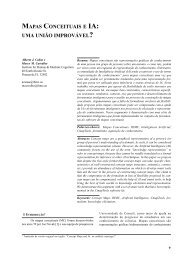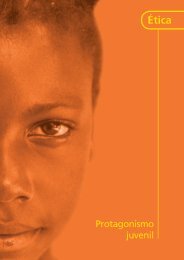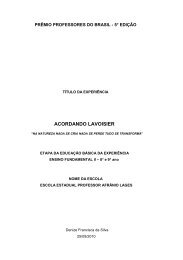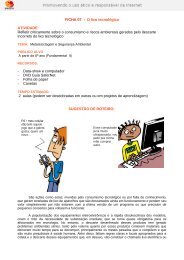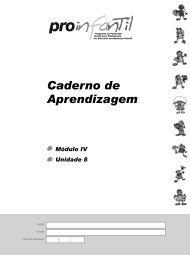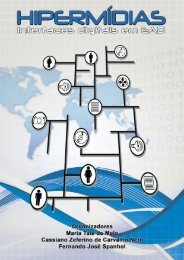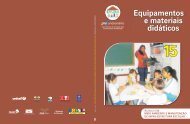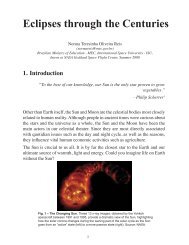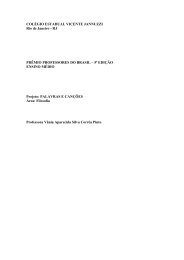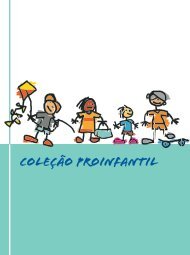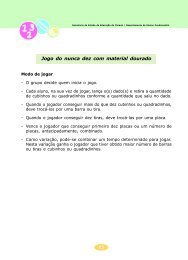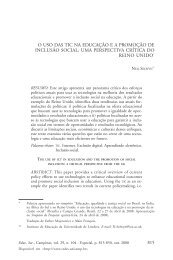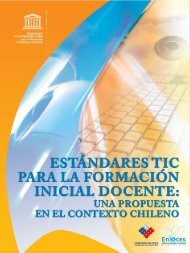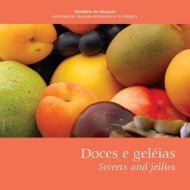BIO-CULTURAL COMMUNITY PROTOCOLS - Portal do Professor
BIO-CULTURAL COMMUNITY PROTOCOLS - Portal do Professor
BIO-CULTURAL COMMUNITY PROTOCOLS - Portal do Professor
You also want an ePaper? Increase the reach of your titles
YUMPU automatically turns print PDFs into web optimized ePapers that Google loves.
APPENDIX RAIKA <strong>BIO</strong>-<strong>CULTURAL</strong> PROTOCOL<br />
3. The Raika shall have the right to<br />
appropriate training and capacity<br />
building and equal access to relevant<br />
services enabling and supporting us to<br />
raise livestock and to better process and<br />
market our products.<br />
This right is supported by:<br />
Article 12 (a) of the Convention on Biological Diversity obliges<br />
Parties to 'establish and maintain programmes for scientific<br />
and technical education and training in measures for the<br />
identification, conservation and sustainable use of biological<br />
diversity and its components'<br />
Article 11 of the Convention on Biological Diversity obliges<br />
Parties to 'a<strong>do</strong>pt economically and socially sound measures<br />
that act as incentives for the conservation and sustainable<br />
use of components of biological diversity'<br />
Article 19 (1) (e) of the United Nations Convention on<br />
Desertification obliges parties to promote capacity building<br />
“by adapting, where necessary, relevant environmentally<br />
sound technology and traditional methods of agriculture<br />
and pastoralism to modern socio-economic conditions”.<br />
Strategic Priority 6 of the Global Plan of Action for Animal<br />
Genetic Resources requests governments to “Support<br />
indigenous and local livestock systems of importance to<br />
animal genetic resources, including through the removal of<br />
factors contributing to genetic erosion. Support may include<br />
the provision of veterinary and extension services, delivery<br />
of microcredit for women in rural areas, appropriate access<br />
to natural resources and to the market, resolving land tenure<br />
issues, the recognition of cultural practices and values,<br />
and adding value to their specialist products.”<br />
4. The Raika shall have the right to<br />
participate in the identification of research<br />
needs and research design with respect<br />
to our genetic resources, as is mandated<br />
by the principle of Prior Informed Consent.<br />
This right is supported by:<br />
Article 8 (j) of the Convention on Biological Diversity (see<br />
above) and Article 10 (d) which says Parties shall “support<br />
local populations to develop and implement remedial<br />
action in degraded areas where biological diversity has<br />
been reduced”. Chapter 15(4) (g) of Agenda 21 require<br />
states to “Recognize and foster the traditional methods<br />
and the knowledge of indigenous people and their<br />
communities … and ensure the opportunity for the<br />
participation of those groups in the economic and<br />
commercial benefits derived from the use of such<br />
traditional methods and knowledge”.<br />
5. The Raika shall have the right to effectively<br />
access information on issues related to<br />
our local breeds and livestock diversity.<br />
This right is supported by:<br />
Article 13 (a) of the Convention on Biological Diversity:<br />
obliges Parties to “Promote and encourage understanding<br />
of the importance of and the measures required for the<br />
conservation of biological diversity, as well as its<br />
propagation through media, and the inclusion of<br />
these topics in educational programmes”.<br />
87



